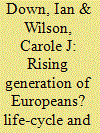| Srl | Item |
| 1 |
ID:
103913


|
|
|
|
|
| Publication |
2011.
|
| Summary/Abstract |
In a stimulating paper, Modigliani and Cao (2004) concluded that most of the huge increase in the household saving rate in China since 1975, the 'Chinese saving puzzle', can be explained by the life-cycle hypothesis. Their analysis is based on the estimation of reduced form equations. However, a structural model of their hypothesis would impose constraints on these equations. For not taking them into account, their test of the life-cycle hypothesis lacks power.
In this paper, we develop a structural model of household saving behavior based on the life-cycle hypothesis for the Chinese economy. We find that the life-cycle hypothesis can explain only 35% of the surge of the Chinese household saving. We then add to the model the strong motivation of young adults for buying a home and the financial support they receive from their parent for that. In this way, the model can reproduce the high and increasing level of saving since the mid-nineties. Nonetheless the increase in household saving, which took place during the eighties, may not be explained by the life-cycle hypothesis.
|
|
|
|
|
|
|
|
|
|
|
|
|
|
|
|
| 2 |
ID:
120506


|
|
|
|
|
| Publication |
2013.
|
| Summary/Abstract |
Despite much research on age and attitudes, it remains unclear whether age reflects accumulated life experience or conditions prevailing during an individual's formative years - that is, a life-cycle effect or a cohort effect. In respect to attitudes towards the European Union (EU), the issue is particularly important. Although many analyses indicate a correlation between age and support, the relationship has not been adequately theorised and extant analyses have generated contradictory results. In this article, theoretical expectations for both life-cycle and cohort effects on support for the EU are developed and tested using a cross random effects model. This not only identifies the nature of an age-support relationship, but also highlights substantial generational differences in attitudes towards European integration and explains the inconsistencies in extant empirical analyses.
|
|
|
|
|
|
|
|
|
|
|
|
|
|
|
|